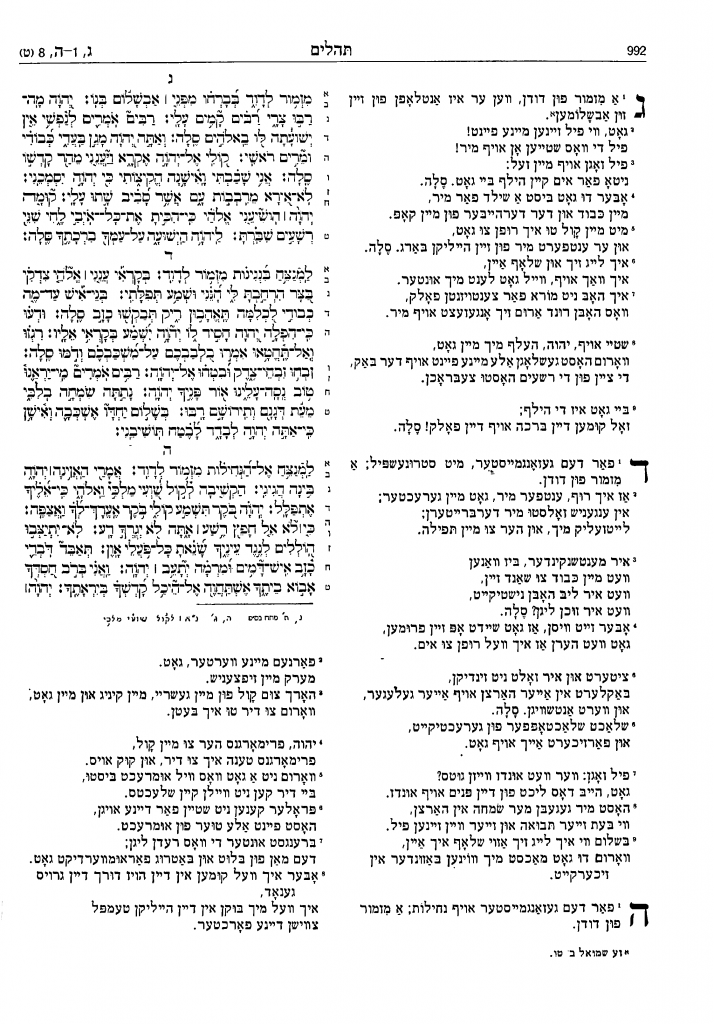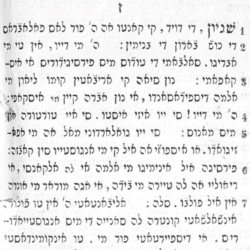Contributor(s): Shared on: Categories: Tags: | Source (Hebrew) | Translation (Yiddish) |
|---|
א לַמְנַצֵּחַ בִּנְגִינוֹת מִזְמוֹר לְדָוִד׃ ב בְּקָרְאִי עֲנֵנִי אֱלֹהֵי צִדְקִי בַּצָּר הִרְחַבְתָּ לִּי חָנֵּנִי וּשְׁמַע תְּפִלָּתִי׃ ג בְּנֵי אִישׁ עַד־מֶה כְבוֹדִי לִכְלִמָּה תֶּאֱהָבוּן רִיק תְּבַקְשׁוּ כָזָב סֶלָה׃ ד וּדְעוּ כִּי־הִפְלָה יְהוָה חָסִיד לוֹ יְהוָה יִשְׁמַע בְּקָרְאִי אֵלָיו׃ ה רִגְזוּ וְאַל־תֶּחֱטָאוּ אִמְרוּ בִלְבַבְכֶם עַל־מִשְׁכַּבְכֶם וְדֹמּוּ סֶלָה׃ ו זִבְחוּ זִבְחֵי־צֶדֶק וּבִטְחוּ אֶל־יְהוָה׃ ז רַבִּים אֹמְרִים מִי־יַרְאֵנוּ טוֹב נְסָה־עָלֵינוּ אוֹר פָּנֶיךָ יְהוָה׃ ח נָתַתָּה שִׂמְחָה בְלִבִּי מֵעֵת דְּגָנָם וְתִירוֹשָׁם רָבּוּ׃ ט בְּשָׁלוֹם יַחְדָּו אֶשְׁכְּבָה וְאִישָׁן כִּי־אַתָּה יְהוָה לְבָדָד לָבֶטַח תּוֹשִׁיבֵנִי׃
| 1 פֿאַר דעם געזאַנגמײַסטער, מיט סטרונעשפּיל; אַ מזמור פֿון דָוִדן.
2 אַז איך רוף, ענטפֿער מיר, גאָט מײַן גערעכטער;
אין ענגעניש זאָלסטו מיר דערברײטערן;
לײַטזעליק מיך, און הער צו מײַן תּפֿילה. 3 איר מענטשנקינדער, ביז װאַנען
װעט מײַן כּבֿוד צו שאַנד זײַן,
װעט איר ליב האָבן נישטיקײט,
װעט איר זוכן ליגן? סֶלָה.
4 אָבער זײַט װיסן, אַז גאָט שײדט אָפּ זײַן פֿרומען,
גאָט װעט הערן אַז איך װעל רופֿן צו אים. 5 ציטערט און איר זאָלט ניט זינדיקן,
באַקלערט אין אײַער האַרצן אױף אײַער געלעגער,
און װערט אַנטשװיגן. סֶלָה.
6 שלאַכט שלאַכטאָפּפֿער פֿון גערעכטיקײט,
און פֿאַרזיכערט אײַך אױף גאָט. 7 פֿיל זאָגן: װער װעט אונדז װײַזן גוטס?
גאָט, הײב דאָס ליכט פֿון דײַן פּנים אױף אונדז.
8 האָסט מיר געגעבן מער שִׂמחה אין האַרצן,
װי בעת זײער תּבֿואה און זײער װײַן זײַנען פֿיל.
9 בשלום װי איך לײג זיך אַזױ שלאָף איך אײַן,
װאָרום דו גאָט מאַכסט מיך װױנען באַזונדער אין זיכערקײט.
|
This is a faithful transcription by the Yehoyesh Project of the Yiddish translation of Psalms 4 made by Yehoyesh Shloyme (Yehoash Solomon) Blumgarten (1870-1927) published in Torah, Neviʼim, u-Khetuvim vol. 2 (New York: Yehoʼash Farlag Gezelshaft, 1941). The complete transcription of Torah, Neviʼim, u-Khetuvim by the Yehoyesh Project in copy/pasteable and searchable plaintext may be found here. Source
 Born in Virbalis, Lithuania (then considered part of Russian-ruled Poland), Yehoyesh (also, Yehoash) was the pen name for Shloyme (Solomon) Blumgarten (also Bloomgarden, 1872-1927), a Yiddish-language poet, scholar and Bible translator. He emigrated to the United States in 1890 and settled in New York. For a decade he was a businessman, but wrote full-time starting in 1900 when he entered a sanitarium for tuberculosis. Yehoash "is generally recognized by those familiar with this literature [Yiddish], as its greatest living poet and one of its most skillful raconteurs", according to a New York Times book review in 1923. His output included verse, translations, poetry, short stories, essays and fables in Yiddish and some articles in English. His poetry was translated into Russian, Dutch, Polish, Finnish, German, Spanish, English and Hebrew. He was responsible for translating many works of world literature into Yiddish, including Longfellow's "Hiawatha" and a very popular translation of the Bible. His version was hailed as a contribution of national significance and perhaps the greatest masterpiece in the Yiddish language. His two volume edition became a standard work for Yiddish speaking homes throughout the world. David ben Yishai was the second king of the United Kingdom of Israel and Judah, reigning ca. 1010–970 BCE. While almost half of the Psalms are headed "l'David" and tradition identifies several with specific events in David’s life (e.g., Psalms № 3, 7, 18, 34, 51, 52, 54, 56, 57, 59, 60, 63 and 142), most scholars consider these headings to be late additions and that no psalm can be attributed to David with certainty. 1 Samuel 16:15-18 describes David as a skillful harp (lyre) player and "the sweet psalmist of Israel." The Yehoyesh Project was an effort to transcribe the entirety of Torah, Neviʼim, u-Khetuvim (New York: Yehoʼash Farlag Gezelshaft, 1941), the Yiddish translation of the TaNaKh by Yehoyesh Shloyme Blumgarten (1870-1927). Leonard Prager z"l (1925-2008), founded the Yehoyesh Project (1998-2006). Robert "Itsik" Goldenberg, Craig Abernethy, Robert Berkovitz, Martin Doering, Matthew Fisher, Jack P. Freer, David Herskovic, Allen Mayberry, Elisheva Schonfeld, Marjorie Schonhaut-Hirshan, and Meyer Wolf all contributed to the success of the project. Read a comment / Leave a comment (moderated) Works of related interest: |












Is Tehilim in Yiddish available, for the entire Sefer Tehilim.?
Yes, the whole Tanakh is available thanks to the work of the Yehoyesh Project. We’ve already shared all of the Yehoyesh Project’s files we recovered with the Sefaria project, but if you’d like the text files yourself, you can find them here. (For a direct link to the Tehilim text file of Yehoyesh Blumgarten’s translation, find it here: ‘Tilim‘).